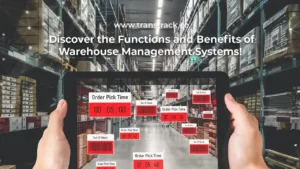How to Improve Fleet Management System Performance in the Mining Industry?
Posted on April 4, 2025 by Nur Wachda Mihmidati

In the world of mining that demands high efficiency and maximum productivity, the role of Fleet Management System (FMS) is becoming increasingly vital. This system not only serves to track vehicles and heavy equipment, but also becomes a control center that regulates workflow, safety, and resource usage in the mining area. However, having an FMS is not enough.
Many mining companies face challenges in maximizing the benefits of these systems due to lack of integration, limited data utilization, or manual operational processes. Therefore, improving FMS performance is not just a matter of technology, but also of strategy and proper implementation.
This TransTRACK article will review practical and strategic ways to optimize Fleet Management System performance in mining environments to support the efficiency and sustainability of mining operations.
What is a fleet management system for mining?
Fleet Management System (FMS) for mines is a technology system designed to manage, monitor and optimize fleets of vehicles and heavy equipment operating in mining areas. The ultimate goal is to improve operational efficiency, safety and productivity of the mine through real-time monitoring and data analysis.
What are the differences between mine and general FMS?
The main difference between a Fleet Management System (FMS) for mines and a FMS for general use (e.g. logistics, distribution, city transportation) lies in the operational requirements, working environment, as well as the complexity of the data being managed. Here is the comparison table:
| Aspects | Mine FMS | General FMS (Logistics/Transportation) |
| Operating Environment | Open mining area, extreme conditions | Public roads, intercity/state routes |
| Vehicle Type | Heavy equipment (hauler, excavator, loader, dozer) | Trucks, vans, buses, motorcycles |
| Main Focus | Material production, work cycle, area safety | On-time delivery, route efficiency |
| Production Monitoring | Yes – calculate the number of hauls, load times, etc. | No – focus on schedule and number of deliveries |
| Navigation System | No public maps, use local coordinates | Use GPS + public street map (Google Maps, etc.) |
| Additional Integrations | Weighbridge, dispatch system, drill/blast system | Logistics ERP, warehouse system, delivery apps |
| Safety | Operator fatigue detection, hazardous areas | Dashcam, seatbelt alert, geofencing |
| Fuel Management | Focus on heavy equipment & high idle usage | Focus on mileage and route efficiency |
| Maintenance | Frequent use of specialized sensors (vibration, temperature, pressure) | Generally based on mileage and time |
| Communication | Digital radio, weak signal → mesh/satellite system | Stable cellular signal, communication via internet |
Conclusion:
Mining FMSs are specifically designed for heavy, high-risk operations and focus on material productivity, whereas general FMSs are more oriented towards shipping, logistics and road fleet management.
What are the Main Components in a Mining Fleet Management System
The following are the main components in a Fleet Management System (FMS) for mines:
1. GPS and Sensor for Heavy Vehicle Tracking
- Function: Provide real-time location data of heavy vehicles and equipment.
- Technology: GPS + auxiliary sensors (RPM, engine temperature, oil pressure, load carrying).
- Benefits: Know the position, route and operational status of the vehicle at any time.
2. Dispatching System for Operational Coordination
- Function: Manage the movement of vehicles and heavy equipment to maximize productivity.
- Features: Task scheduling, load/unload queues, automatic vehicle allocation.
- Benefits: Reduce waiting time, optimize work cycles, and improve field efficiency.
3. Fuel Management and Fuel Consumption Monitoring
- Functions: Monitor fuel consumption and detect anomalies such as theft or leaks.
- Features: Tank level sensor, hourly consumption measurement, idle time, and efficiency report.
- Benefits: Control operational costs and detect deviations early.
4. Heavy Equipment Productivity Monitoring
- Function: Measure the performance of heavy equipment such as excavators, dump trucks, loaders, etc.
- Features: Cycle time tracking, ritase count, load & unload duration, and productivity analysis.
- Benefits: Determine operator KPIs, balance workload, and increase daily output.
5. Alert System for Safety and Auto Maintenance
- Functions: Provides automatic alerts related to potential hazards, operator behavior, and vehicle maintenance.
- Features: Geofencing of vulnerable areas, excessive speed, operator fatigue, service reminders.
- Benefits: Reduce work accidents, ensure equipment is in top condition, and improve operational compliance.
How Fleet Management System Works in Mining Area
The following is an explanation of how a Fleet Management System (FMS) works in a mine site, covering data flow, tool integration, and analysis for decision making:
1. Data Flow from Vehicle to Control Center
- Step 1: Data Collection on Vehicle
- Sensors and GPS devices collect data such as location, speed, load carrying, fuel, engine status, etc.
- Step 2: Data Transmission
- Data is sent in real-time to the central server using GPRS, radio frequency, Wi-Fi mesh, or VSAT (for remote areas) networks.
- Step 3: Reception in the Control Room
- The control center receives data from all vehicles and machines to be displayed on the monitoring dashboard.
2. Integration with Hardware
- IoT Devices & Sensors
- Monitor various vehicle parameters (RPM, temperature, pressure, load).
- RFID & Weighbridge Integration
- Used to identify the vehicle unit and automatically record the tonnage when passing through the weighbridge.
- Cameras (DVR & Dashcam AI)
- Monitoring driver behavior, on-field events, and used as incident evidence.
- Display Panel for Operators
- Provides notifications or instructions from the control center to the driver/operator.
3. Data Analysis for Operational Decision Making
- Automated Processing & Analysis
- Data is automatically analyzed to detect anomalies (e.g. idling too long, high fuel consumption, or non-optimal routes).
- Dashboards & Daily Reports
- Presented in the form of graphs, daily KPIs, activity heatmaps, and machine work cycle history.
- Decision Making
- The mine supervisor or control room can:
- Adjust vehicle allocation
- Reorganize routes
- Scheduling maintenance
- Giving direct instructions to the field
- The mine supervisor or control room can:
What are the main benefits of FMS for mining companies?
Here are the main benefits of Fleet Management System (FMS) for mining companies:
1. Improved Productivity of Heavy Equipment and Operators
- Ensure optimal utilization of heavy equipment through monitoring of work cycles, ritase, and idle time.
- Improve operator work efficiency with real-time dispatch and feedback system.
2. Reduced Downtime and Maintenance Costs
- Early warning system for potential equipment damage.
- Automated maintenance schedule based on working hours and machine condition, not just a calendar.
3. Real-Time Safety Monitoring
- Detect operator fatigue, overspeeding, or safety zone violations (geofencing).
- Integration with safety cameras and sensors to prevent accidents.
4. Fuel and Operational Control
- Monitoring of fuel consumption per ritase, idle, and workload.
- Detection of leaks, theft, or fuel wastage.
5. Accurate Reporting for Audit and Compliance
- Historical data and automated reports to support internal audits, HSE regulations and government compliance.
- Digital evidence for investigation of operational incidents or disputes.
These benefits overall drive cost efficiency, increased output and mine safety.
FMS Function in Mining Industry
Fleet Management System (FMS) is a technology that can help manage vehicle fleets efficiently and effectively. In the mining industry, FMS serves as a very important fleet management tool because the use of vehicles such as dump trucks, excavators, bulldozers, and others is very significant for the success of mining operations.
The following is a more detailed explanation of the FMS function in the mining industry:
Monitoring and control
FMS allows fleet managers to monitor the location of vehicles in real-time, thus providing the information needed to manage and optimize vehicle usage. In addition, FMS also allows fleet managers to manage vehicle maintenance and driver supervision so that vehicles are always in good condition and drivers stay within the safety zone.
Optimization of vehicle usage
FMS can help optimize vehicle usage by managing travel routes, operating times, and maximizing vehicle carrying capacity. By doing so, FMS can help reduce operational costs and extend vehicle life.
Increased productivity
FMS allows fleet managers to monitor vehicle and driver performance in real-time, thereby increasing the productivity of mining operations. In addition, FMS can also help organize maintenance and spare part replacement schedules so that vehicles are always in good condition and avoid damage that can interfere with the productivity of mining operations.
Controlling operational costs
FMS can help control operating costs by minimizing the cost of fuel, maintenance, and replacement parts. In addition, FMS can also help reduce costs due to driver error or vehicle damage from inappropriate use.
Safety enhancement
FMS can help improve vehicle and driver safety by providing the information needed to make informed decisions. In addition, FMS can also monitor driver behavior to prevent violations and accidents.
Overall, the use of FMS in the mining industry can help optimize vehicle fleet operations so as to improve efficiency, productivity, and safety, as well as reduce operational costs. This is of course very important for the mining industry as the vehicle fleet is one of the most valuable assets in the success of mining operations.
Advantages of Using FMS for Mining Industry
The use of Fleet Management System (FMS) in the mining industry can provide many benefits, including:
Optimization of Fleet Usage
With FMS, fleet managers can optimize the use of vehicle fleets by managing travel routes, operating times, and maximizing vehicle carrying capacity. By doing so, the Fleet Management System can help reduce operational costs and extend vehicle life.
Operational Cost Savings
FMS can help save operational costs by minimizing the cost of fuel, maintenance, and replacement parts. In addition, a Fleet Management System can also help reduce costs due to driver error or vehicle damage from inappropriate use.
Improved Efficiency
With FMS, fleet managers can monitor vehicle and driver performance in real-time, thereby improving the efficiency of mining operations. In addition, the Fleet Management System can also help organize maintenance and spare part replacement schedules so that vehicles are always in good condition and avoid damage that can interfere with the efficiency of mining operations.
Safety Enhancement
FMS can help improve vehicle and driver safety by providing the information needed to make informed decisions. In addition, the Fleet Management System can also monitor driver behavior to prevent violations and accidents.
Increased Productivity
With FMS, fleet managers can monitor vehicle and driver performance in real-time, thereby increasing the productivity of mining operations. In addition, the Fleet Management System can also help organize maintenance and spare part replacement schedules so that vehicles are always in good condition and avoid damage that can interfere with the productivity of mining operations.
Better Decision Making
The Fleet Management System provides accurate and real-time data and information, allowing fleet managers to make better and more timely decisions. This helps to improve the efficiency, productivity and safety of mining operations.
Overall, the use of FMS in the mining industry can help optimize vehicle fleet operations to improve efficiency, productivity and safety, and reduce operating costs. This is of course very important for the mining industry as the vehicle fleet is one of the most valuable assets in the success of mining operations.
How to Improve Fleet Management
Here are some ways to improve fleet management:
Real-time Vehicle Monitoring
Real-time vehicle monitoring can help speed up responses to problems that occur on vehicles. By using GPS technology, fleet managers can monitor the location and performance of vehicles in real-time so that they can take quick corrective action.
Data Analysis
Data collection and analysis can help optimize the use of the vehicle fleet. Data such as fuel consumption, speed, and mileage can provide the information needed to make informed decisions, such as arranging the best routes, setting maintenance schedules, and saving costs.
Driver Training
Driver training can help improve driver skills and safety. Effective training can help reduce the risk of accidents and vehicle damage due to driver error.
Regular Vehicle Maintenance
Regular vehicle maintenance can help extend the life of your vehicle and reduce maintenance costs. Regular maintenance such as oil changes, filters, and replacement of worn parts can help keep the vehicle in good condition and avoid unnecessary damage.
Fleet Management System (FMS) Implementation
Fleet Management System (FMS) can help improve fleet management by monitoring vehicle and driver performance in real-time. FMS can help optimize vehicle fleet usage, reduce operational costs, improve efficiency and safety of fleet operations, and provide accurate information for better decision making.
Fuel Consumption Monitoring
Monitoring vehicle fuel consumption can help save fleet operating costs. By monitoring fuel consumption, fleet managers can take actions to reduce unnecessary fuel use, such as adjusting travel schedules and vehicle speeds.
Replacement of Aging Vehicles
Aging or obsolete vehicles can compromise the efficiency and productivity of fleet operations. Replacing aging or obsolete vehicles can help improve efficiency and reduce unnecessary maintenance costs.
Overall, improving fleet management can help increase efficiency, productivity, safety, and reduce operating costs. The use of technology and proper management can help optimize the use of the vehicle fleet and ensure the success of fleet operations in the long run.

Now all of these methods have been implemented through Fleet Management System in TransTRACK. You can use TransTRACK’s FMS to increase the efficiency of your fleet and optimize productivity during working hours. Start using TransTRACK’s Fleet Management System TransTRACK and enjoy all its excellent features!
Recent Post
Topic :
 Bahasa Indonesia
Bahasa Indonesia









